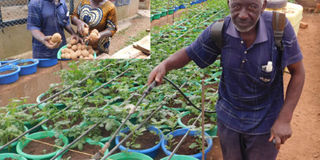Prime
My wife’s potato business smoothened retirement

Karugaba sprays his crop garden. Inset the couple displays their output. Photos/ Robert Muhereza.
My wife’s potato business smoothened retirement, Mafuga plantation forest in Kigezi Sub-region, John Mary K Karugaba
John Mary K Karugaba is a retired assistant forest officer whose wife’s potato seed production project employed him after his retirement.
Karugaba, a resident of Karukara Village in Hamurwa Sub-county, Rubanda District, served as an assistant forest officer in Mafuga plantation forest in Kigezi Sub-region from 1975 until he retired in 2006.
“My wife started Irish potato seed production in 2002. She amassed expertise and her business was booming. When I retired, I joined her because the project pays better than salary,” Karugaba says.
His first salary as a government employee was Shs2,450 and by the time he retired it had increased to Shs 400,000. The father of six, says his salary was majorly for paying tuition and after the wife’s project took off, it supplemented his monthly salary to facilitate the university education of their children.
“I prepared for my retirement by allowing my wife Fidelis Karugaba to actively participate in workshops and trainings that provided her knowledge in clean Irish potato production.
When I retired she trained me in that field and in less than four months I was an expert. We encouraged all our children to love potato seed production and by the time each of them completed university education they had joined the project,” he says.
“We have formed Kigezi Farmers’ Resource Centre Company, a family seed production company so that we can easily trade with government institutions and other NGOs that require clean seed potato seedlings.”
Preparation
However, before retirement, he used some of his savings to buy pieces of land on which his wife would produce Irish potato seed for selling locally to individual and farmers groups with the help of hired labourers that would be paid daily for their services.
He adds that after his retirement, the government gave him Shs25m as his retirement package and he invested half of it in buying more land since he had seen a bright future in Irish potato seed production. Now the family company has about 30 acres of land on which they practice modern farming methods in clean Irish potato seed production.
Big business
Because of the increased demand for their produced clean potato seed, the Karugabas relocated from Hamurwa Town Council to Karungu Village in Rubanda District. This is about nine kilometres away from their home where they had plenty of land for the expansion of their project.
“We started with locally made stores where we would screen and produce clean potato seed in bulk and this attracted non governmental organisations to support us with modern screen houses and modern technologies that have boosted our production,” Karugaba shares.
He adds that, in 2014, the International Fertiliser Development Centre, an international organisation operating in Uganda, funded the construction of two modern screen houses for the production of clean Irish potato seed that has largely boosted our production.
“ We used to produce eight to 15 bags of 100Kgs each using local technologies but since we started using the modern technologies, we produce about 400 bags in bad season per year while in good season we produce up to 1,000 bags.
A bag of clean potato seed ranges between Shs200,000 and Shs250,000.
Our main customers are government institutions such as the Naads, farmer groups and individual farmers in and outside Uganda,” Karugaba explains in reference to how they generate income.
No regrets
Karugaba is happy to have invested his savings and later on, the retirement benefits into his wife’s potato seed production because he earns about Shs1m per month which he never earned when he was still a government employee. He also argues that if he had opted for an early retirement, may be at 50 years, he would be richer by now.
“My wife’s project provided food for the family all these years and it kept me busy after retirement unlike some of my colleagues that opted to spend most of their time in bars drinking themselves silly.
That has claimed some of their lives while others are now destitute. When I had joined my wife in her money-making project, some of my peers speculated rumours that my wife had bewitched me but I did not listen to such because I knew what I wanted,” Karugaba adds.
Benefitting others
The 70-year-old says the family project employs about 30 people per season in both planting and harvest and also about 15 permanent workers that provide labour in weeding and spraying their gardens. He says that on average each employee is paid Shs7,000 per day inclusive of lunch.
“Some of the employees we started with have since made their own clean potato seed production using local means and this has increased clean seed production in the area although the demand is still high.
At our farm, we supply clean potato seed on the first come, first served principle and those that fail to get seed we consider them for the second season. We have two seasons of seed production in a year,” Karugaba says.
He says with one acre of land planted with 12 bags of clean potato seed, one can harvest up to 120 bags of 100kg each under good and modern farming methods that include timely application of fertilisers and herbicides to control pests and diseases.
Two cents
“I encourage those in government employment to save for their retirement and also involve their family members in domestic income-generating projects so that they get a befitting retirement besides creating jobs for their family members,” Karugaba says.
“Despite the fact that my children are graduates, none of them is job-hunting. The family business my wife started with my support pays them well,” he says.




